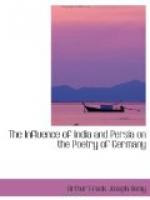Travels to India and Persia now multiplied rapidly, and accounts of such travels became very common; so common, in fact, that already in the sixteenth century collections of them were made, the best known being the Novus Orbis of Grynaeus, and the works of Ramusio and Hakluyt. Among the more famous travellers of the sixteenth century we may mention Barthema, Federici, Barbosa, Fitch and van Linschoten for India, and the brothers Shirley for Persia. In the seventeenth century we may cite the names of della Valle, Baldaeus, Tavernier, Bernier and the German Mandelslo for India, while those of Olearius and Chardin are most famous in connection with Persia. And that books of travel were much read in Germany is attested by the number of editions and translations which appeared there. Thus among the earliest books printed there we have a translation of Marco Polo (Nuremberg), 1477,[50] reprinted repeatedly, e.g. at Augsburg, 1481, in the Novus Orbis, 1534 (Latin version), at Basle, 1534 (German translation of the preceding), while Mandeville’s memoirs were so popular as to become finally a Volksbuch.[51]
The account of Olearius is of special interest to us. It gives an excellent description of Persia, and above all it gives us valuable information on the literature and language. Olearius is struck by the similarity of many Persian words to corresponding words in German and Latin, and hints at the kinship of these idioms, though, looking only at the vocabulary and not at the structure, he supposes Persian to be related to Arabic.[52] He tells us of the high esteem in which poetry was held by the Persians, and notices that rhyme is an indispensable requisite of their poetic art. He also mentions some of their leading poets, among them Sa’di, Hafid, Firdausi and Nidami.[53]
* * * * *
But what interests us most is the translation which he made of the Gulistan, published in 1654, under the title of Persianischer Rosenthal. True, it was not the first in point of time. As early as 1634 du Ryer had published at Paris an incomplete French version, and shortly afterwards this version was translated into German by Johann Friedrich Ochsenbach of Tuebingen, but apparently without attracting much notice.[54] In 1644, Levin Warner of Leyden had given the Persian text and Latin version of a number of Sa’di’s maxims,[55] while Gentius had published the whole text with a Latin translation at Amsterdam in 1651. But it was the version of Olearius that really introduced the Gulistan to Europe.




